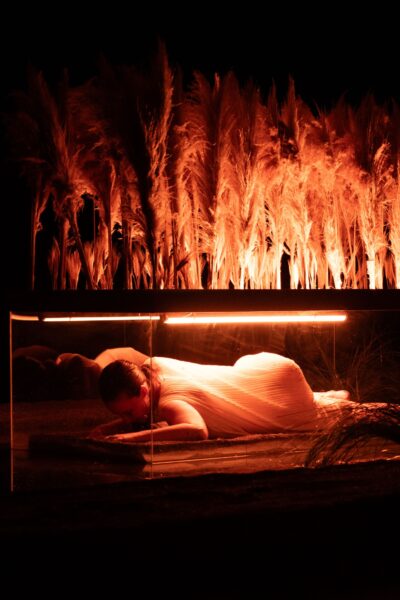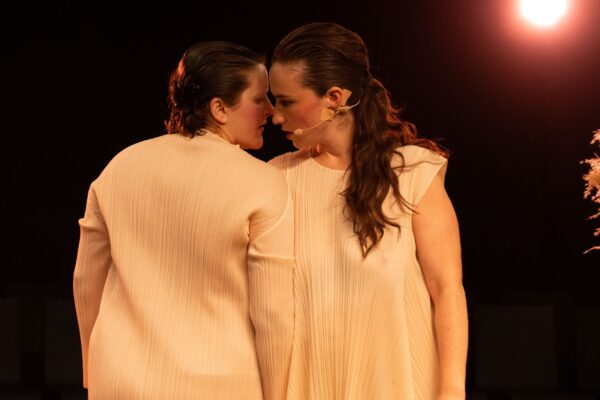MUST ALL NEW OPERAS HAVE TO BE
PSEUDO-INTELLECTUAL AND JOYLESS?
I was in no shape to see Isola, by composer Alyssa Weinberg and poet J. Mae Barizo, presented by Long Beach Opera in its world-premiere run. My apartment had been burglarized the night before and I just wanted to stay home and lick my wounds. “Go, you’ll feel better,” said my editor-in-chief. “LBO does great work,” he said. Indeed, I have fond memories of their productions of Akhnaten, Nixon in China, and Moscow, Cherry Town. So, I took the hour-long drive to Compound in Long Beach to see the hour-long opera and attempt to whistle-a-happy-tune myself into positivity.
As I enter the warehouse-cum-theater, Prairie T. Trivuth’s striking set confronts me. Arranged as a thrust space (more like a catwalk), it is a large mound of dirt with weeds, water pooling in the center. In the middle of the pond, Dancer (played by choreographer Julia Eichten) lies naked in a plexiglass LED-lit coffin, like a perverted take on Snow White. On top of the coffin is a field of wheat, leading me to wonder if wheat grows in swamps. Accompanying this is Greg Curtis’s atmospheric and environmental sound design laced with heavy breathing. The lights dim and, for three pointless minutes, the five remaining performers slowly take their starting places one-by-one to a droning overhead noise.
Like nails on chalkboard, the three-piece ensemble, two violins and a cello, screech the start of the opera. Yes, it was one of those nights. If I hadn’t committed to this assignment, I would have started considering the sunk-cost fallacy right then.
The libretto consists of 14 poems; Weinberg gives each a different musical treatment. Several of them have gimmicks. One scene has the two violinists playing with ping-pong balls—one rolling a ball around in a saucepan, the other bouncing one on a xylophone. Not playing the xylophone with a ping-pong ball, but bouncing it on a single bar. Other gimmicks include crumpling paper and literally beating the crap out of an expensive-looking toy piano. I can totally dig gimmicks, but none here were used in a sustained, meaningful way. A whispered scene was undercut by Compound’s DJ thumping away in the adjacent building.
It seemed like there was some kind of plot going on, but George R. Miller’s direction and Curtis’s sound obscured it. The story begins with Dancer writhing out from her coffin like a reanimated monster. She and Soprano (Ariadne Greif) walk around. Soprano sings and is angsty. Dancer undresses and dresses Soprano. Both splash around. They have a sweet bonding moment where they lean against each other, only for Soprano to banish Dancer back to the coffin.
The production was amplified, in spite of being in a small space. Greif wore an ugly face microphone. These are obnoxious in most productions, but when Greif went topless, she revealed a huge sweaty elastic band holding the transmitter, looking like the most unappealing corset, with an appalling mass of wire and tape stuck to her back. Now, though it’s difficult, I can get past visually obtrusive miking, but the sound design was such that I couldn’t make out most of what Greif sung. While Greif sung live, Curtis overlaid multiple pre-recorded tracks of a woman speaking the same words, mixing them at the same level. Whenever this happened, I instinctively looked for the speaker, which, of course, didn’t exist. This probably sounds great on headphones, but it was unintelligible. I could only catch fragments here and there, such as the unexpected, “in the morning i went to the office.” [sic] All this storm is about some office worker?
When Greif was standing right in front of me, I could hear her just fine. (Comprehension was a different story. The music was so slow that, despite Greif’s skill, it distorted the words. Would you understand “All I am is fooooo-yes!”?) However, like any good director, Miller used all of the performance space. This meant that Greif would be on the opposite side of the room with her back facing my seating area for large chunks of the show. Her voice became distant and overpowered by the much-closer strings. Speaking of opposite sides, Eichten and Greif were often placed on the far side of the wheat field (where the section over there got a full view), so I could only see them from the shoulder-up, including the first time Greif undressed. Good thing I didn’t come for the nudity.
Another problem with the blocking was that, while the active performer was on the opposite side of the room and facing that side, there was nothing near me to look at. Couldn’t hear, couldn’t see.
Instead of projecting open captions (thank you, LBO!), spectators were handed the book of poems that comprises Isola. During one of the many lulls, I looked around at the audience. Some were locked and buried into reading along, completely ignoring the staging. Everyone else was looking at … different things. There was no focal point for the audience.
Conductor Lucy Tucker Yates, dressed in a stunning white dress fit for a marble statue, kept everything together, often mouthing along while her stone-faced string players (Mona Tian, Adrianne Pope, Mia Barcia-Columbo) dutifully executed the music. Greif’s performance was most impressive during her character’s meltdown. Eichten’s choreography started strong and interesting, but the staging left her easy to ignore, which was a shame. Julio César Delgado’s minimal costuming was light and looked good wet. Jasmine Lesane’s lighting was dynamic and colorful, but she should have hidden the musicians’ blinking LEDs.
You may accuse me of not studying the program beforehand, thereby not giving the work a chance. From the program: “prismatic meditation”; “process of text assembly”; and “phenomenological inquiry, inviting the audience to suspend Time.” No. I demand that everything I need to know comes from the performance and that programs be written in English. You may be thinking that I should have stayed home. Perhaps, but I was also still smarting from Last Days, the new opera that the LA Phil staged earlier in the week, which was 90 dreary minutes of horror-movie strings. Must all new operas have to be so pseudo-intellectual and joyless?
photos by JJ Geiger for Long Beach Opera
Isola
Long Beach Opera
Compound, 1395 Coronado Ave in Long Beach
reviewed on February 10
played February 3, 10 and 11, 2024
for future shows (see Stage and Cinema‘s preview), for tickets, call 562.470.7464 or visit LBO








{ 2 comments… read them below or add one }
This was Alyssa Weinberg’s first opera, and hopefully her last. Another case of the emperor has no clothes.
Sadly I agree. Long Beach Opera has gone off the deep end, certainly for those of us who appreciate the canon, staging that works for the audience, and (kindly the author did not mention this) a dancer who looks the part of a dancer. Maybe some young folks like this but the audience is thinning. LBO won’t be at the LB Civic Center in the near future.